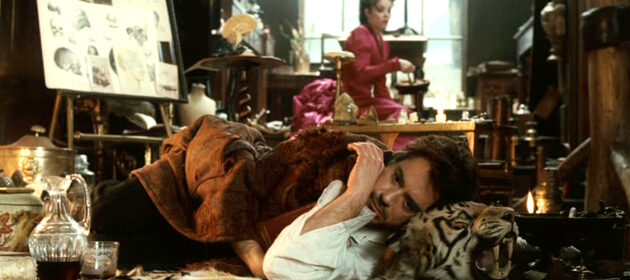Sarah Greenwood

AS: Would you say that’s similar requirements for the crew that you hire?
SG: Yes, I think so. I have an amazing crew that I work with. You know some people drop off and we pick out new but generally I have a core team that I always work with and that’s brilliant because as prep times get shorter and shorter you need that short hand with them to get things fast and moving.
It’s very much a meritocracy- if you’re good at something, then do it. I’m not one for saying, Oh, they’re only an art department assistant, they can’t do that. If they’re a fantastic propmaker, or they’re fantastic at something, then do it. I’m not hierarchical. Interestingly my team all tend to come through one particular woman called Moira Tate who used to run Kingston and then she was running a course at the National Film School. I think she’s been at the Royal College. Interestingly I’ve had loads of people who’d been through her hands. Those were the ones that I really liked working with. Also I really like working with people who have come through TV because it does give them a more egalitarian approach to film making which is the way I like to work.
AS: Would you say it’s good to learn from TV work because the pace is faster and there are smaller budgets and you have to come up with things quickly?
SG: Yes, absolutely. And also on a TV drama you maybe have got a production designer, an art director and a standby art director and one set decorator and you do everything and you know about everything. It’s very important that people do know about everything. How the whole film goes together. You have an art department of fifty on Sherlock Holmes but I expect everybody to have read the script and to know what’s going on in the script. And to go out and see everybody else’s sets. Don’t just work on your tiny little bit and not ever leave the drawing board. Why do what you’re doing if that’s where you’ll be. Be interested in the whole process and the failures and the solutions that we come up with. It’s funny because sometimes you’ll have people who’ve worked on the film and they’ll go, My god I didn’t realize it was going to be like that! And you go, Well, hang on a minute: why? You were there, with us, you should know everything!
And it’s gotta be fun. If it’s not fun then there’s no point in doing it. Because it takes so much of your life and energy over. You have to enjoy it. Good and bad you have to enjoy it.
AS: When you get a project and get a script what’s one of the first things you do when you’re starting in on it?
SG: Which is what I’m doing at the moment, actually. Well, if there’s a book that goes with it like Anna Karenina, you read the book. I’m reading another fantastic book which is by Orlando Figes called Natasha’s Dance which is all about Russian society from the 1600’s. Why they built St. Petersberg, what Moscow was like, what society was like at the time. Frankly if you don’t know that I don’t see how you can understand how Anna Karenina in Tolstoy’s mind worked. You have to know that. Whether you choose to use it, to apply it, is up to Joe and myself. But you have to know as much as you can know about the subject. That’s even before we start.
Pingback: Laurence Bennett